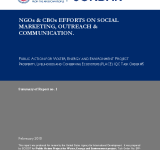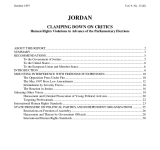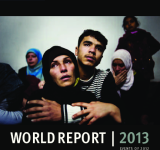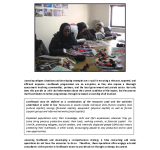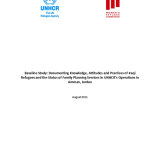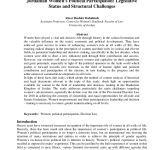The report is based on the findings of the survey that was designed to review NGO/CBO experience in communication/outreach and assess the capability of individual staff in the relevant NGOS and CBOs. The primary goal of the project is to institutionalize social marketing practices in NGOs and CBOs;; because organizations in the forefront of development depend on their ability to reach target groups and remove barriers to change. The research was conducted as part of the Public Action in Water;; Energy;; and Environmental Project to initiate and establish clear and identifiable behavioral changes amongst the Jordanian public and decision-makers;; to lead to increased efficiency in the use of water and energy;; and to improve solid waste handling practices. The main findings of the research identify sources of funds and grants of the NGOs;; their major activities and partnerships. The report also suggests training for successful fundraising;; social marketing and media campaigns for the NGOs and continued surveys and interviews of the NGOs.
Jordan
Since Jordan signed a peace treaty with Israel in 1994;; there has been growing tension between the Jordanian government and the independent press;; particularly the kingdom's small-circulation weekly newspapers. Journalists and editors have been arrested;; detained and prosecuted for violations of both the penal code and provisions of the press and publications law of 1993. By the count of one Jordanian weekly newspaper;; since the law went into effect sixty-two cases have been brought against journalists and editors;; the overwhelming majority of them with weekly newspapers. Faced with public opposition to normalization of relations with Israel;; frustration about the implementation of the Oslo Accords between Israel and the Palestinian Authority;; and popular discontent with the state of the economy and high rates of unemployment and underemployment;; Jordanian authorities have clearly signaled a growing discomfort with the exercise of freedom of expression by both individual critics and the press.
Freedom of expression and press freedom are essential conditions for the conduct of free and fair elections. But in the pre-election period;; Jordanian authorities have used the laws in force;; and other means such as threats and intimidation by internal security forces and government officials;; to restrict free expression;; including press freedom;; in violation of the International Covenant on Civil and Political Rights (ICCPR);; which Jordan has ratified. This report documents a series of actions taken by the government to tame the print media -- including the temporary closure of thirteen weekly newspapers in September -- and intimidate political critics into silence. Journalists and editors told Human Rights Watch that they have followed a stricter regime of self-censorship since the amendments to the press law were implemented in May 1997;; for fear of being subjected to heavy financial penalties mandated under the new law. In addition;; students;; writers;; and researchers have faced a variety of sanctions -- ranging from detention;; criminal prosecution;; and imprisonment to harassment;; job loss;; and blacklisting -- because they expressed views on political subjects that the government preferred remain off-limits. Such measures have created an atmosphere in which the right to free expression is perceived by many in Jordan as under siege.
This 23rd annual World Report summarizes human rights conditions in more than 90 countries and territories worldwide in 2012. It reflects extensive investigative work that Human Rights Watch staff has undertaken during the year;; often in close partnership with domestic human rights activists.
Assessing refugee situations and developing strategies are crucial in ensuring a relevant;; targeted;; and efficient response. Livelihoods programmes are no exception;; as they also require a thorough assessment involving communities;; partners;; and the local government and private sector. Not only does this provide us with vital information about the current condition of the region;; but the process itself contributes to better programmes through increased ownership of all involved. UNHCR Jordan developed a quality strategy using their internal resources and networks. This is a story about their experience and the lessons learnt in the process.
This report addresses a family planning (FP) study undertaken by the United Nations High Commissioner (UNHCR);; the Women's Refugee Commission (WRC) and the Centers for Disease Control and Prevention (CDC) among Iraqi refugees in Amman;; Jordan in June-July;; 2011. It documents the knowledge;; beliefs;; perceptions and practices of refugees;; as well as the state of service provision to improve programming and subsequently increase uptake of good quality FP services among Iraqi women;; men and adolescents.
This study sheds light on the status of legislative drafting in the Jordanian legal system. It explores both the parties entrusted with the drafting of legislation as well as the entities that aid the drafting. In addition;; the paper looks into legal problems that arise during implementation and the effects on the quality of the legislative product. The study adoptes a descriptive approach to identify and answer the research questions.
This study sheds light on opportunities available to women in the field of leadership and decision- making in the Hashemite Kingdom of Jordan. It explores the main challenges impeding women's advancement;; especially the debate over the role of the Provisional Election Law for 2010 in achieving the concepts of citizenship;; and equal opportunities for all male and female Jordanians. In order to answer the research questions;; the study analyzed historical and legal documents.
